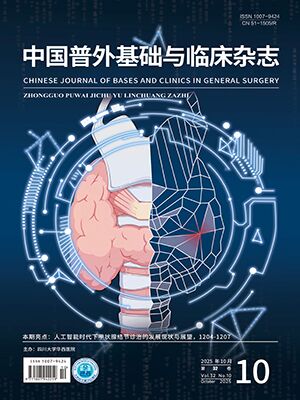| 1. |
陈万青, 郑荣寿, 张思维, 等. 2012 年中国恶性肿瘤发病和死亡分析. 中国肿瘤, 2016, 25(1): 1-8.
|
| 2. |
Kawada K, Taketo MM. Significance and mechanism of lymph node metastasis in cancer progression. Cancer Res, 2011, 71(4): 1214-1218.
|
| 3. |
虞华明. 大肠癌免疫组织化学表达与临床病理的关系. 实用医技杂志, 2016, 23(8): 889-890.
|
| 4. |
张渊智, 武子涛, 李世荣. 原发性结直肠癌 594 例的临床病理与遗传易感性. 世界华人消化杂志, 2004, 12(8): 1509-1813.
|
| 5. |
Littman DR, Rudensky AY. Th17 and regulatory T cells in mediating and restraining inflammation. Cell, 2010, 140(6): 845-858.
|
| 6. |
陈道瑾, 周逢强, 甘毅. 结直肠癌前哨淋巴结体外标记的研究. 中华胃肠外科杂志, 2006, 9(2): 124-126.
|
| 7. |
Cabanas RM. An approach for the treatment of penile carcinoma. Cancer, 1977, 39(2): 456-466.
|
| 8. |
Morton DL, Wen DR, Wong JH, et al. Technical details of intraoperative lymphatic mapping for early stage melanoma. Arch Surg, 1992, 127(4): 392-399.
|
| 9. |
Yokota T, Saito T, Narushima Y, et al. Lymph-node staining with activated carbon CH40: a new method for axillary lymph-node dissection in breast cancer. Can J Surg, 2000, 43(3): 191-196.
|
| 10. |
江国斌, 方红燕, 蔡建明. 纳米碳混悬液示踪前哨淋巴结在甲状腺乳头状癌中的应用. 中国癌症杂志, 2010, 20(12): 938-940.
|
| 11. |
Okamoto K, Sawai K, Minato H, et al. Number and anatomical extent of lymph node metastases in gastric cancer: analysis using intra-lymph node injection of activated carbon particles (CH40). Jpn J Clin Oncol, 1999, 29(2): 74-77.
|
| 12. |
程科, 庄競, 李保东, 等. 纳米碳淋巴示踪剂在腹腔镜辅助下进展期胃癌根治术中的应用及评价. 中国普外基础与临床杂志, 2016, 23(12): 1460-1463.
|
| 13. |
Albayrak Y, Oren D, Gündoğdu C, et al. Intraoperative sentinel lymph node mapping in patients with colon cancer: study of 38 cases. Turk J Gastrocnterol, 2011, 22(3): 286-292.
|
| 14. |
吕顺增, 李超, 赵婧, 等. 3 种染料示踪剂对鼠肢体淋巴结示踪显色时间和淋巴管走行途径的比较研究. 中国现代普通外科进展, 2012, 15(10): 767-770.
|
| 15. |
Willaert W, Ceelen W. Extent of surgery in cancer of the colon: is more better? World J Gastroenterol, 2015, 21(1): 132-138.
|
| 16. |
Saha S, Nora D, Wong JH, et al. Sentinel lymph node mapping in colorectal cancer–a review. Surg Clin North Am, 2000, 80(6): 1811-1819.
|
| 17. |
van der Zaag ES, Bouma WH, Peters HM, et al. Implications of sentinel lymph node mapping on nodal staging and prognosis in colorectal cancer. Colorectal Dis, 2012, 14(6): 684-690.
|
| 18. |
van der Pas MH, Meijer S, Hoekstra OS, et al. Sentinel-lymph-node procedure in colon and rectal cancer: a systematic review and meta-analysis. Lancet Oncol, 2011, 12(6): 540-550.
|
| 19. |
Hao RT, Chen J, Zhao LH, et al. Sentinel lymph node biopsy using carbon nanoparticles for Chinese patients with papillary thyroid microcarcinoma. Eur J Surg Oncol, 2012, 38(8): 718-724.
|
| 20. |
张润, 王思洋, 汪晓东, 等. 纳米碳的临床应用研究进展. 肿瘤学杂志, 2012, 18(11): 866-869.
|
| 21. |
Yan J, Xue F, Chen H, et al. A multi-center study of using carbon nanoparticles to track lymph node metastasis in T1-2 colorectal cancer. Surg Endosc, 2014, 28(12): 3315-3321.
|
| 22. |
刘永安, 黎艳芳, 陶琦, 等. 直肠拖出双吻合器保肛术治疗超低位直肠癌临床报道. 中国普通外科杂志, 2012, 21(10): 1308-1309.
|
| 23. |
Lindsetmo RO, Joh YG, Delaney CP. Surgical treatment for rectal cancer: an international perspective on what the medical gastroenterologist needs to know. World J Gastroenterol, 2008, 14(21): 3281-3289.
|
| 24. |
童汉兴, 赵纲, 陆巍, 等. 联合纳米炭和 99mTc-硫胶体标记法行直肠癌前哨淋巴结活检的研究. 中国实用外科杂志, 2009, 29(9): 733-735.
|
| 25. |
童汉兴, 张勇, 张思, 等. 结直肠癌前哨淋巴结活检及前哨淋巴结微转移检测方法研究. 中国临床医学, 2010, 18(5): 591-594.
|




